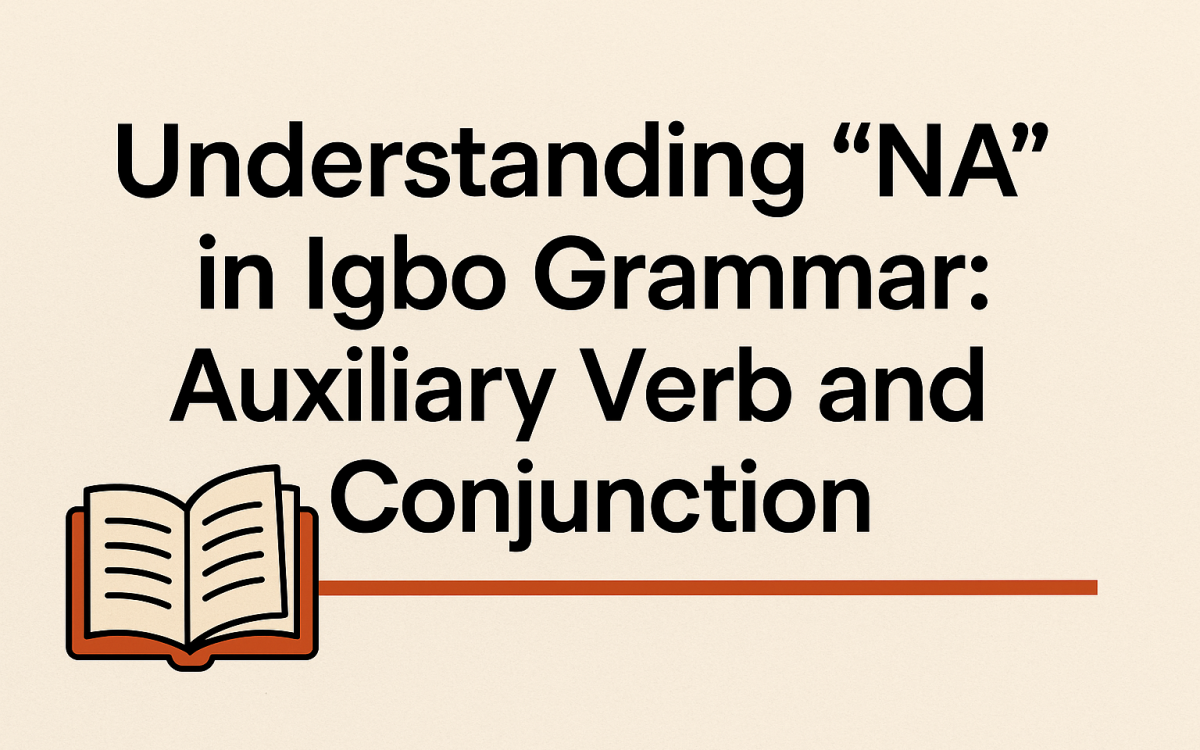Understanding “NA” in Igbo Grammar: Auxiliary Verb and Conjunction
The small but powerful word “NA” carries multiple roles in the Igbo language. Depending on context, it can serve as an auxiliary verb or a conjunction. Knowing how it functions will make your Igbo sound more natural and precise.
📖 If you missed the beginning of this series, you can find Part I here: The Journey of “Na” in Igbo Language: Part I.
1. “NA” dịka Nnyemaaka Ngwaa (Auxiliary Verb)
Mgbe “NA” na-arụ ọrụ dịka nnyemaaka ngwaa, ọ na-egosi emume na-aga n’ihu n’oge a. Mgbe na na-aru ọrụ dika nnyemaaka ngwaa, a na-edoka ya na ngwaa ọ na-enyere aka site itinye akara edemede nke a na-akpọ hyphen (hyphen).
When NA works as an auxiliary verb, it marks a continuing or ongoing action in the present tense. In this role, NA is joined to the main verb with a hyphen.
Examples:
- Anyi na-amu asụsụ Igbo – We are learning the Igbo language.
- Ha NA-ekpe udo – They are negotiating for peace.
- Ike NA-eri ji na Jamini – Ike is eating yams in Germany.
- Obi NA-ekwu eziokwu – Obi is telling the truth.
- Ndi mmadu NA-atu egwu ọgba aghara – People are afraid of commotion.
- Ndi kwee ndi ekweghi NA-ebụta ọgba aghara – Misunderstanding breeds mistrust.
- Naijiria bụ agụ NA-eri nwa ya – Nigeria is a lion that eats its cubs.
The hyphen is the sign that NA is acting as an auxiliary verb.
2. “NA” dịka Njikọ Mkpọaha (Conjunction)
“NA” nwekwara ike ịbụ njikọ mkpọaha, nke pụtara “and.” Mgbe na na-arụ ọrụ dika njiko mkpọaha, a na-ede ya ka ọ kwuru onwe ya.
NA can also play the role of a conjunction, similar to the English “and.” In this case, it stands alone without a hyphen.
Examples:
- Obi NA Ada bu nwanne – Ada and Obi are relatives.
- Aki NA ụkwa di ụtọ – Kernel and breadfruit are delicious.
- Ngọzi NA Nkechi bu ụmụakwụkwọ – Ngozi and Nkechi are students.
- Mba Ukrenu NA Rọshia na-alu agha – Ukraine and Russia are at war.
- Oke NA ngwere nọ n’ọsọ – Rat and lizard are running helter-skelter (Everyone is in panic mode)
- Egbe NA egbe abughi otu ihe – A Kite and a gun (sound the same but) are two different things. (Certain things might appear the same yet distinct from one another.)
- Udo NA ifunanya ka anyi ji bia – We came with peace and love.
Here, NA links two nouns or ideas.
Closing Remark
Ụzọ anyị gara taa gosiri na okwu nta dịka NA nwere nnukwu ike n’asụsụ Igbo. Ịmata mgbe ọ bụ nnyemaaka ngwaa na mgbe ọ bụ njikọ mkpọaha na-eme ka anyị ghọta na ihe nta nwere ike ime ka okwu buru nnukwu ihe.
Today’s lesson demonstrates that even a small word like ‘NA’ carries profound meaning in Igbo grammar. Distinguishing when it acts as an auxiliary verb and when it serves as a conjunction is a key step in mastering the language.
💬 Over to you! Have you noticed different ways NA is used in everyday Igbo conversation, proverbs, or songs? Share your examples in the comments—we’re learning this language together.
✨ Don’t miss out on Part III of “The Journey of NA in Igbo Language,” coming soon! Subscribe to the blog so you’ll be the first to know when it drops.
#LearnIgbo, #IgboLanguage, #IgboGrammar, #AfricanLanguages, #LanguageLearning, #NaInIgbo,
-
Facebook
-
Twitter
-
Linkedin
-
Whatsapp






